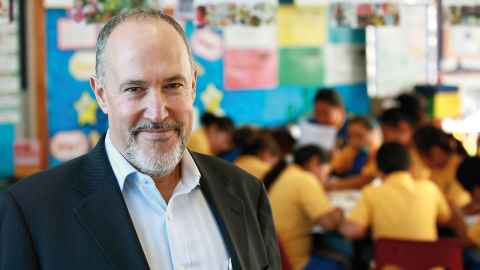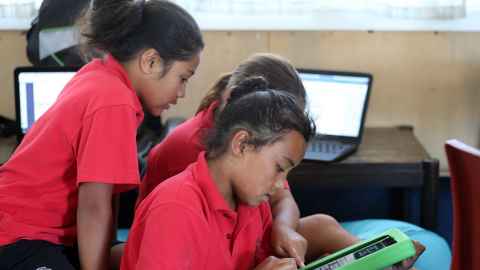Big dreams, real results: Stuart McNaughton's Woolf Fisher legacy
10 December 2019
Professor Stuart McNaughton ONZM is retiring as the director of the Woolf Fisher Research Centre at the end of the year. He looks back on highlights of his 21-year tenure.

How do you not so much level, but actually change the playing field for children who are not well-served by our schools, particularly those in low income communities with large Māori and Pacific populations?
This was the ambitious question Professors Stuart McNaughton and Graham Hingangaroa Smith asked themselves in 1998 when they co-founded the Woolf Fisher Research Centre “with three people in an office at Manukau Institute of Technology (MIT)”.
“We knew we didn’t just want to offer professional development to teachers,” says Professor McNaughton. “We really did need to understand what would make the difference at a basic equity and excellence level, and that was going to involve scientifically robust methods for testing and measuring.”
Named for its benefactor, New Zealand businessman and philanthropist Sir Woolf Fisher, the centre was given start up funding by the Woolf Fisher Trust, which has continued to support it ever since. Dedicated to ‘the promotion of successful learning communities’, and the first of its kind in New Zealand, it was firmly based in South Auckland.
“Graham and I wanted to locate it in the communities with whom we first partnered to improve schools’ and early learning centres’ effectiveness,” he says. “It has grown in several ways; the research partnerships, for example, have extended beyond South Auckland across New Zealand, and to Australia and the Pacific Islands.”
We really did need to understand what would make the difference at a basic equity and excellence level, and that was going to involve scientifically robust methods for testing and measuring.
Having since relocated to the University’s Faculty of Education and Social Work at Epsom Campus, the Woolf Fisher Research Centre now employs more than 12 researchers, statisticians and a facilitator, has a multi-million dollar budget and a string of success stories. And its director has won numerous awards, including the Dame Joan Metge Medal from the Royal Society Te Apārangi (2016) and the University of Auckland Research Excellence Award in 2015.
“What I appreciate about these awards is the explicit recognition of the group or team impact through what might be called ‘improvement science’ or ‘implementation science’,” says Professor McNaughton. “Making a difference in complex educational worlds requires hard science. In other words, focusing the research onto the everyday experiences which make a meaningful difference to the whole school community, and getting measurable and sustainable results.”
The centre's goal is to make a difference, at scale, right across the educational sector, and successful recent examples include partnerships with a large numbers of schools, particularly the Manaiakalani schools in South Auckland.
“This is a cluster of primary and secondary schools which banded together in 2007 as a ‘community of interest’ looking for a better way to engage the children in their predominantly decile 1 area. We’ve been able to develop models for how to improve effectiveness at both the national and international level.”

In 2012, the Manaiakalani Education Trust contracted researchers at Woolf Fisher to evaluate their educational programme which was being taught in a small number of schools in East Auckland. Digital learning, using individual Chromebooks, Google Classroom and other innovative tools proved to be the successful hook to engaging the students, and the schools were resourced through a Trust which provided every child access to a device.
However, teachers still had to develop effective teaching using these new tools to solve educational challenges in a digital environment. “And what they were doing not only needed to be evaluated to see what sort of difference it was making but also to be understood in scientific terms for two big reasons, often not addressed in educational research: to make further improvements and redesigns possible, and so that what was proven to be effective could be taken to scale."
While it’s common for children in schools to be doing a lot of their work on devices now, it was new in 2012 when the first cycle of three-year partnerships with the centre started. Looking back at the results, he says there was a “substantial acceleration” for students in Years 4 to 10 when tracked over the three years, especially in writing.
“If a child was continuously present in a Manaiakalani school, that is, they got the full ‘dosage’, the rate of gain in writing was twice that expected nationally. This means that these students, on average, made one more year’s progress above the expected rate per year if they were there for three years. The accelerated rate for reading and maths, although lower at half a year’s additional gain, was still educationally significant.”
I wanted it to make the point that educational research, which is funded at only a fraction of medical research and other physical sciences but arguably makes just as much difference to a measure like GDP, has to be just as rigorous and just as robust.
Alongside the development of a new partnership model for school improvement science which they called The Learning Schools Model, Woolf Fisher researchers discovered the need for new roles for educators who could analyse data, share practices and determine effectiveness, he says.
“At the centre, we tested a design for that role and with new funding from the Woolf Fisher Trust, set up the ‘Lead Teachers Masters scholarships’ that became prototypes, not only for skills needed in our partnerships, but for contributing to a national design for any network of schools that decided to connect in that way.” The development of communities of learning (Kahu Ako) have included these roles.
Another highlight has been maintaining the centre and his University role alongside his position as the government’s first Chief Education Scientific Advisor, which he took up in 2014. The word ‘scientific’ in the title, he says, is there for a reason.
“First to not assume the position is about science education. More importantly, I wanted it to make the point that educational research, which is funded at only a fraction of medical research and other physical sciences but arguably makes just as much difference to a measure like GDP, has to be just as rigorous and just as robust."

“Like medicine, it uses a range of rigorous methods including complex statistical analysis to draw careful and reasonable conclusions.” The role has given him an understanding of how to forge pathways for research evidence to inform policy, and vice versa.
“I’ve planned the centre to also function as a vehicle for developing second and third-generation researchers in educational sciences, through doctoral pathways within programmes of research. This has been very successful, with all three of the associate directors taking that pathway.”
A specific focus has been to support Māori and Pacific researchers, with a previous associate director being Samoan and doctoral and postdoctoral researchers who are Māori and Pacific. To cement this direction, at the 21st celebration of the centre held this year, it formally announced its Māori name, Te Pūtahi Whakatairanga Hapori Ako Angitu, (The Centre for the Promotion of Successful Learning Communities) which was gifted by Te Puna Wānanga colleague Hemi Dale.
Another highlight of his tenure has been the development of “fruitful international collaborations”, including top tier university ECNU in Shanghai. “We know these relationships are essential in many respects, but that includes the notion of science diplomacy; that is, contributing to the bilateral linkages between research and policy development across counties," he says.
He held the position of Distinguished Overseas Professor at East China Normal University in Shanghai between 2014 and 2018, and from 2019, was a Senior Research Fellow at the Shanghai Municipal Institute for Lifelong Education at the same university.
It’s about being focused on how to make a difference to what we value as a nation – equity, excellence, innovation – in the messy, complex, but ultimately extraordinary places we educate our children and young people.
Other Woolf Fisher research and publication collaborators have included the WestEd Strategic Literacy Initiative based in San Francisco, the Norwegian University of Science and Technology (NTNU) and the University of the South Pacific. The team has also worked with schools and educators in the Far North, Australia, the Cook Islands, Tonga and the Solomon Islands to “find out on the ground how to adapt what works somewhere like South or East Auckland to other contexts", he says.
Enduring partnerships with philanthropists have also been a highlight. “Working with remarkable philanthropic and public good partners alongside dedicated educators has shown me that research that makes a difference relies on different groups coming together to create a critical mass. That includes policy colleagues as well as family and whānau. I’ve also learned that we learn from each other about how to do this well.”
At the end of this year, Professor McNaughton passes the baton on to colleague Professor Christine Rubie-Davies, although he’ll continue as a researcher and project leader. Does he have any parting advice?
“It’s about being focused on how to make a difference to what we value as a nation – equity, excellence, innovation – in the messy, complex but ultimately extraordinary places we educate our children and young people.”
Media contact
Julianne Evans | Media Adviser
Mob: 027 562 5868
Email: julianne.evans@auckland.ac.nz